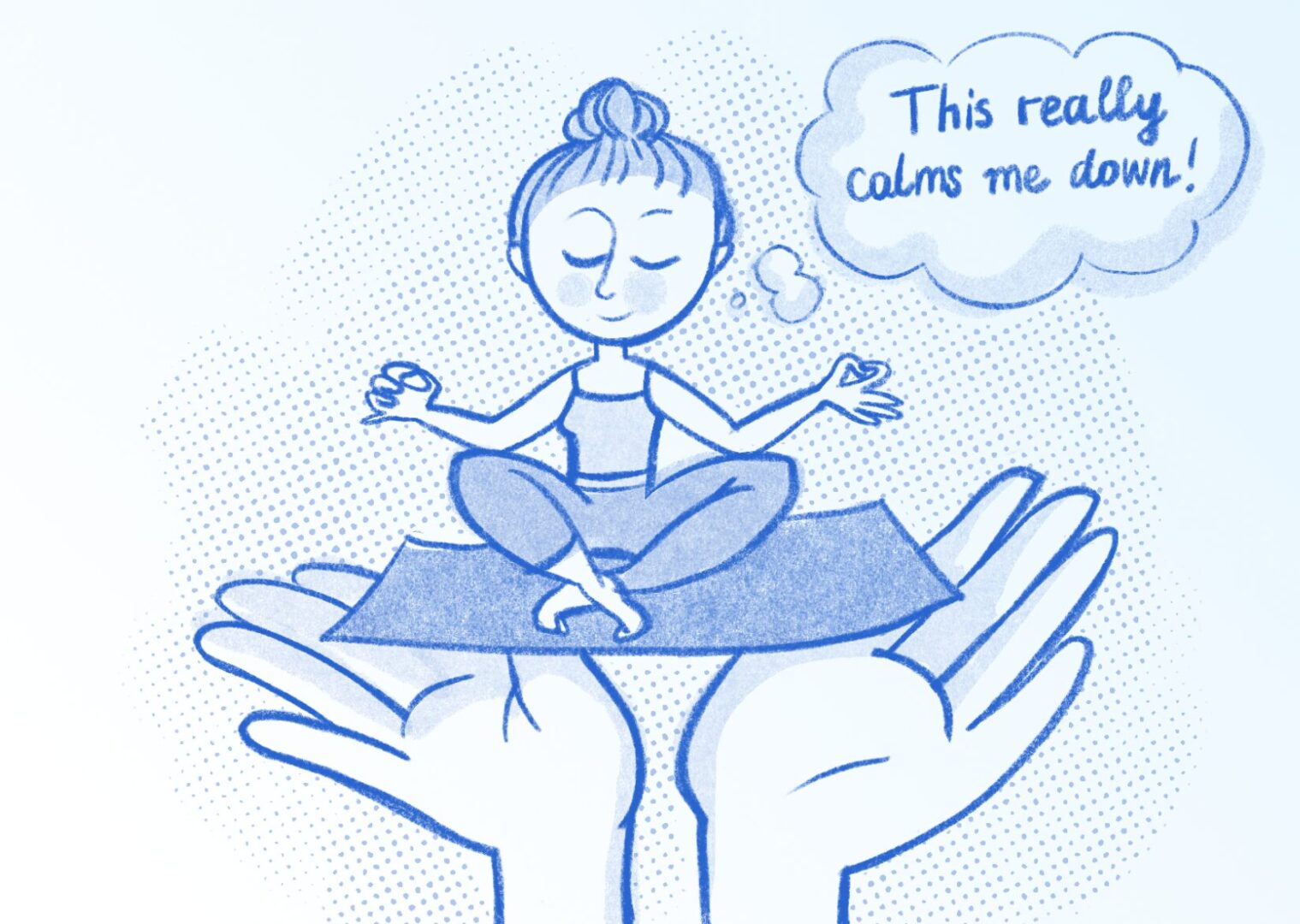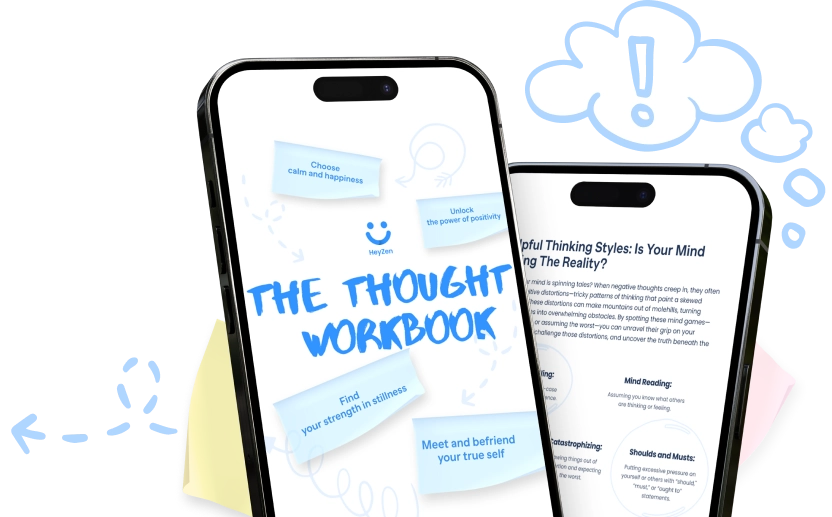Handpicked & Tested Best Meditation Apps for Inner Peace

Finding inner peace can feel like an impossible task, right? While meditation offers lots of benefits for mental well-being, many of us struggle to develop a consistent practice. That’s where mindfulness apps come in, making mindfulness more accessible and building routine easier! Whether you’re a complete beginner or an experienced practitioner, these digital tools can transform your meditation journey. From guided sessions as short as one minute to comprehensive 30-minute programs, today’s online tools offer features designed to fit seamlessly into your busy lifestyle. They’ll help you manage stress, improve sleep quality, and develop mindfulness skills—all from the convenience of your smartphone.
Key takeaways
- Meditation apps have revolutionized mindfulness practice, making it more accessible through guided sessions ranging from 1 to 30 minutes.
- Leading apps like HeyZen, Buddhify, and Smiling Mind offer unique features tailored to different user needs, from beginners to experienced practitioners.
- Scientific research confirms meditation apps can reduce stress by 30%, improve sleep quality by 30%, and decrease depression symptoms by 40% within 10-30 days.
- Regular meditation practice through apps provides multiple benefits, including stress reduction, better sleep, increased focus, enhanced self-awareness, and improved emotional balance.
- The effectiveness of meditation apps depends on consistent practice, with optimal results achieved through 10-20 minutes of daily meditation for at least 10-30 days.
- While apps make meditation more accessible, users should be aware of limitations like device distractions, over-reliance on guided sessions, and technical constraints.
What is meditation and its types
Meditation is a mindfulness practice that seeks to cultivate a state of focused awareness, clarity, and emotional calmness. At its core, it involves training the mind to achieve a mentally clear and emotionally calm state. There are numerous meditative techniques and styles, each offering unique benefits and catering to different preferences.
Concentration meditation
It focuses on the development of concentration by fixing one’s attention on a single point of focus. This could involve focusing on the breath, a specific sound, or a visual object, such as a candle flame. This practice enhances mental clarity, improves cognitive function, and fosters a greater sense of inner peace. This technique is especially useful for individuals who struggle with distractions or those looking to strengthen their cognitive abilities.
Loving-kindness meditation
Also known as “Metta”, the practice is rooted in Buddhist tradition that focuses on cultivating a deep sense of compassion and unconditional love towards oneself and others. The core intention of this type of meditation is to foster an attitude of loving-kindness, which can lead to increased emotional well-being and improved interpersonal relationships. The practice begins with a series of affirmations or phrases aimed at generating feelings of goodwill, happiness, and warmth towards oneself. Over time, practitioners gradually expand their circle of compassion to include friends, acquaintances, and even those with whom they may have conflicts.
When you engage in Metta, the process typically starts by finding a quiet space where you can comfortably sit or lie down. You might start with deep breathing to center your mind, bringing your focus to the present moment. From there, practitioners generally recite phrases such as “May I be happy,” “May I be healthy,” and “May I be safe.” These affirmations serve as a foundational element, allowing feelings of compassion to develop. After establishing a loving attitude toward oneself, the practice progresses towards radiating that kindness to loved ones, neutral individuals, and eventually, to those who provoke feelings of anger or resentment.
Mindfulness meditation
It has gained immense popularity in recent years as a straightforward yet powerful approach to enhancing mental health and overall well-being. At its core, mindfulness practice involves focusing attention on the present moment, observing thoughts, feelings, and bodily sensations with a non-judgmental attitude. This practice encourages individuals to cultivate an awareness of their thoughts and emotions without becoming overwhelmed by them, leading to improved emotional regulation and reduced stress. For many, adopting mindfulness as a regular practice has proven transformative, fostering resilience and clarity in an increasingly chaotic world.
Studies reveal practitioners spend 47% less time in mind-wandering states compared to non-meditators.
Walking meditation
It’s an ancient practice that seamlessly merges the physical act of walking with the principles of mindfulness. Unlike traditional seated practice, walking meditation promotes awareness and presence in each step, fostering a deep connection between body and mind. For those who find it challenging to sit still, this method offers a dynamic alternative that encourages focus and contemplation while engaging with the environment. As we delve into its benefits, techniques, and recommended apps for 2025, it’s essential to appreciate how walking meditation can serve as a vital tool for mental well-being and personal growth.
To practice walking meditation, one does not need elaborate settings or extensive periods of time. A quiet outdoor path, a serene park, or even a spacious indoor area can serve as an ideal location. The key is to walk slowly and deliberately, paying close attention to the sensations of movement. It involves being aware of each footstep, noticing how your feet connect with the ground, and becoming attuned to your breathing. As thoughts arise, practitioners are encouraged to acknowledge them without judgment and gently redirect their focus back to their sensations. This process helps cultivate an enriched sense of presence, promoting clarity and tranquility amidst daily life’s chaos.
Body scan meditation
Body scan meditation is a popular technique within the realm of mindfulness practices that offers a profound method for connecting with one’s physical sensations and emotional state. This practice involves systematically focusing attention on each part of the body, starting from the toes and moving up to the crown of the head. By engaging in this process, individuals are encouraged to develop a deeper awareness of bodily sensations, which can reveal areas of tension or discomfort. This awareness is crucial, as it establishes a foundation for relaxation and stress relief, helping practitioners to cultivate a more mindful presence in their everyday lives.
Research shows regular practice improves sleep quality and reduces chronic pain symptoms.
Gratitude meditation
The essence of gratitude meditation lies in focusing one’s thoughts on the positive aspects of life, which not only enhances emotional well-being but has also been shown to improve overall mental health. By cultivating a mindset of gratitude, practitioners can counteract negative emotions and reduce stress levels, thereby leading to a more fulfilling and balanced life. This practice is particularly vital in today’s fast-paced world, where individuals often overlook the simple joys and accomplishments in their daily routines.
During the practice, people are typically guided to reflect on specific aspects of their lives for which they are thankful. This could range from relationships and personal achievements to even small, everyday moments of joy, like watching a sunset or enjoying a cup of coffee. Practice elements include:
- Reflecting on daily blessings.
- Acknowledging supportive relationships.
- Recognizing personal growth.
- Appreciating simple pleasures.
- Expressing thankfulness mentally.
The benefits of meditation
1. Reduction of stress and anxiety
Studies have shown that even short, consistent sessions of meditation can significantly lower levels of cortisol, the hormone often referred to as the “stress hormone.” This reduction not only helps create a sense of calm but also improves overall well-being, which can lead to better physical health outcomes, including lowered blood pressure and enhanced immune function.
2. Better concentration and focus
In our fast-paced, digitally dominated world, distractions are omnipresent, making it challenging to maintain attention on tasks. Mindfulness meditation, in particular, equips individuals with the ability to immerse themselves in the present moment, minimizing distractions and improving cognitive function. This is especially beneficial for those juggling multiple responsibilities or engaging in complex problem-solving tasks. As enhanced focus translates to increased productivity, individuals find that they are able to achieve their goals more efficiently, which feeds back positively into their self-esteem and mental health.
3. Improved emotional well-being and self-awareness
By fostering greater self-awareness, meditation encourages practitioners to explore their thoughts and feelings without judgment. This introspective practice helps in identifying negative thought patterns, enabling individuals to reframe their mental narratives in a healthier, more constructive manner. This, in turn, can lead to improved emotional regulation and resilience, empowering individuals to navigate life’s challenges with greater ease. The transformation often experienced through meditation practice extends to personal relationships as well, as increased empathy and compassion emerge, paving the way for deeper connections with others.
So, here are the key benefits of meditation:
- Reduces Stress: Lowers cortisol levels and blood pressure through focused breathing techniques.
- Improves Sleep Quality: Enhances natural sleep patterns and decreases insomnia symptoms.
- Increases Focus: Strengthens attention span and mental clarity throughout daily tasks.
- Enhances Self-Awareness: Develops deeper understanding of thoughts and emotional patterns.
- Boosts Emotional Balance: Creates space between reactions and responses to challenging situations.
Physical health improvements from meditation include:
| Health Metric | Improvement |
| Blood Pressure | 5-10% reduction |
| Heart Rate | 4-8 beats/minute decrease |
| Stress Hormones | 15% reduction |
| Sleep Quality | 30% enhancement |
Research indicates meditation’s effectiveness in managing:
- Pain Management: Reduces chronic pain intensity perception.
- Immune Function: Strengthens the body’s natural defense mechanisms.
- Brain Function: Increases gray matter density in areas linked to learning memory.
- Emotional Processing: Reduces activity in the amygdala stress response center.
Detailed reviews of top meditation apps
Top meditation apps offer diverse features to support both beginners and experienced practitioners in their mindfulness journey. Here’s a detailed analysis of the leading meditation apps for 2025.
HeyZen
HeyZen promotes a holistic approach to wellness, as together with various meditation types, the platform offers educational podcasts on emotional well-being and yoga-therapy sessions—all bundled up for each day.
Key features
- Daily personalized plans with a meditative practice, a podcast, and a yoga therapy session.
- 100+ meditations and breathing exercises.
- 15+ SOS meditations for emergency help with crying, anxiety, fear, and panic attacks.
- Psychological podcasts that aim to help people understand themselves and their relationships and manage daily stress.
- Daily affirmations and jokes to keep you upbeat.
Pros:
- User-friendly and pleasant interface.
- Free self-assessment test for anxiety.
- A free trial with a plan personalized to your unique needs.
- Various mindfulness exercises targeting different mental issues.
- Features for people with ADHD, anxiety, and PTSD.
Cons:
- Free days of a personal plan are limited.
Pricing
| Plan | Cost |
| Weekly | $7 |
| Annual | $24 |
Headspace
Headspace stands out as a comprehensive meditation platform with a structured learning approach for users at all experience levels.
Key features
- 500+ meditation and mindfulness tools.
- Structured meditation courses for specific goals.
- Mindful exercises for daily activities.
- Mini Meditation Moments.
- Sleep stories for a more restful sleep.
Pros:
- Beginner-friendly interface.
- Clear progression system.
- Flexible session lengths.
- High-quality audio content.
Cons:
- Limited free content.
- Higher price point.
- No community features.
Pricing
| Plan | Cost |
| Monthly | $12.99 |
| Annual | $69.99 |
| Family | $99.99/year |
User experience
- Clean interface with intuitive navigation.
- Animated tutorials for better understanding.
- Progress tracking dashboard.
- Customizable meditation reminders.
Buddhify
Buddhify takes a unique approach by offering situation-specific meditations for different daily activities.
Key features
- 200+ guided meditations.
- Activity-based meditation wheel.
- Customizable categories.
- Timer for self-guided practice.
- Stats tracking system.
Pros:
- Context-specific meditations.
- One-time purchase option.
- Offline access.
- Voice recording feature.
Cons:
- Limited content updates.
- No free version.
- Basic design interface.
Pricing
| Plan | Cost |
| One-time purchase | $4.99 |
| Annual membership | $30.00 |
User experience
- Wheel interface for meditation selection.
- Simple navigation system.
- Built-in statistics tracking.
- Personalized meditation recordings.
Smiling Mind
Smiling Mind is the best free meditation app that focuses on age-appropriate mindfulness content for children and adults.
Key features
- Age-specific programs.
- Child-friendly exercises.
- Educational resources.
- Sport-focused meditations.
- Progress tracking tools.
Pros:
- Free guided meditations.
- Research-backed content.
- Family-friendly design.
- Educational focus.
Cons:
- Limited advanced content.
- Basic features.
- Regional content focus.
Pricing
| Plan | Cost |
| All features | Free |
User experience
- Age-appropriate interface.
- Simple navigation.
- Progress tracking.
- Family accounts.
- Educational resources section.
How to Choose the Right Meditation App: 4 steps
When venturing into the world of meditation apps, it’s essential to identify what aligns with your personal goals and preferences. The vast array of choices available in 2025 can be overwhelming, but by understanding your needs and the unique features apps offer, you can streamline your decision-making process.
Step 1. Begin by considering your primary motivation for meditating. Are you seeking to reduce stress, improve focus, enhance sleep quality, or cultivate mindfulness? Different apps target specific outcomes, so identifying your intention will help narrow down your options significantly.
Step 2. Look at the app’s content variety. A well-rounded app should offer a diverse selection of guided meditations, mindfulness practices, soothing soundscapes, and possibly even educational resources explaining various meditative techniques. Consider whether you prefer short sessions that fit into your busy schedule or longer, more immersive experiences. It’s also worth exploring whether the app includes features such as daily reminders, progress tracking, or customizable playlists, as these can enhance your experience and help you stay committed to your practice.
Step 3. Check user experience and interface design. An intuitive layout, smooth navigation, and aesthetically pleasing design can make your practice more enjoyable and less distracting. Many modern apps prioritize user engagement by including gamification elements, social features, or community-building tools, such as forums or live sessions. While these components can add a layer of excitement to your practice, they may not be essential for everyone. Prioritize finding an app that feels comfortable and welcoming to you, as a satisfying user experience can significantly improve adherence to your mindfulness routine.
Step 4. Pay attention to the pricing structure of the app. While some apps offer free basic versions, many of the more comprehensive features require a subscription or a one-time purchase. Weigh the benefits of a paid subscription against your budget and look for trial periods that allow you to experience the content and features before committing financially. Reading user reviews and testimonials can provide valuable insight into the community’s reception of the app, helping you gauge its efficacy and satisfaction.
Getting the most out of your meditation app
Apps can transform effective mindfulness practice through structured guidance and tracking tools. Here’s how to maximize their benefits for your meditation journey.
Setting up a routine
Creating a consistent meditation schedule enhances the effectiveness of app-based practice. Start with 5-minute sessions at the same time each day, such as right after waking up or before bed. Set automated reminders in the app to maintain consistency.
Consider these routine-building strategies:
- Select a dedicated space free from distractions.
- Practice at optimal energy times (morning: 6-8 AM, evening: 7-9 PM).
- Begin with guided sessions matched to your experience level.
- Increase session duration by 2-3 minutes every two weeks.
- Schedule backup meditation times for unexpected interruptions.
Tracking progress
Apps provide data-driven insights to monitor your mindfulness journey. Track these key metrics:
| Metric | Purpose | Frequency |
| Session Duration | Measure practice length | Daily |
| Streak Days | Monitor consistency | Weekly |
| Mood Changes | Track emotional patterns | Daily |
| Focus Levels | Assess concentration | Per session |
| Sleep Quality | Evaluate rest impact | Daily |
Use the app’s analytics dashboard to identify patterns in:
- Peak performance times.
- Most effective meditation types.
- Stress reduction correlation.
- Sleep quality improvements.
- Focus enhancement periods.
Combining app use with other practices
To maximize the benefits of using these applications, it’s essential to consider how they can complement other wellness practices:
- Include in your routine physical activities such as yoga or tai chi to enhance both mental and physical well-being. The fluid movements of these practices encourage mindfulness and can help deepen your experience.
- Combine breathwork techniques with your meditation sessions. When you focus on your breath, you not only prepare your mind for meditation but also improve your respiratory function and overall emotional health.
- Pair meditation app usage with journaling. Reflecting on your thoughts post-meditation can foster a deeper understanding of your mental state, helping to identify patterns that need further attention. Many meditation apps offer journaling features or prompts that can guide users in this process. Writing down feelings or insights after a mindfulness session can help reinforce the positive effects experienced during the practice. Moreover, it can serve as a valuable tool for tracking progress and making adjustments to one’s wellness routine.
- Expose yourself to nature. Research shows that spending time outdoors can significantly enhance the overall benefits of meditation. Apps often include outdoor-themed sessions, encouraging users to find a serene setting where they can connect with nature. Whether it’s practicing mindfulness while walking through a park or listening to nature sounds during a session, these experiences can elevate emotional and spiritual health, leading to a more profound sense of peace and fulfillment.
Think about the following schedule of holistic wellness practices:
- Practice body scanning during lunch breaks.
- Incorporate 10-minute breathing exercises between meetings.
- Use walking meditation features during outdoor activities.
- Listen to meditative music during commutes.
- Apply mindfulness techniques from the app in real-world situations.
- Writing post-meditation reflections.
- Joining in-app community discussions.
- Attending local meditation groups.
- Reading mindfulness literature.
- Practicing informal mindfulness throughout daily activities.
The science behind meditation apps
Digital meditation platforms leverage neuroscientific principles to create evidence-based mindfulness experiences. Research demonstrates measurable changes in brain structure through consistent app-guided meditative practice.
Research on app effectiveness
Clinical studies validate the effectiveness of meditation apps in reducing stress markers during regular practice sessions. A 2024 study in the Journal of Clinical Psychology found that users practicing guided meditation through apps for 10 minutes daily experienced a 27% reduction in cortisol levels after 8 weeks.
| Research Metrics | Results |
| Cortisol Reduction | 27% |
| Anxiety Decrease | 31% |
| Sleep Quality Improvement | 42% |
| Focus Enhancement | 38% |
Neuroscience research confirms meditation apps activate key brain regions associated with emotional regulation. Brain imaging studies reveal increased gray matter density in the hippocampus among app users who meditate 15 minutes daily for 3 months. Users demonstrate enhanced activity in the prefrontal cortex, the area responsible for attention control attention and executive function.
Mobile meditation platforms incorporate proven techniques like focused breathing and mindfulness body scanning into their digital interface. Research published in Frontiers in Psychology indicates guided meditation sessions through apps produce comparable benefits to in-person instruction when used consistently. The structured approach of these applications helps maintain practice consistency, with data showing 64% higher meditation adherence rates compared to self-guided methods.
Evidence supports the effectiveness of gamification elements in meditation apps for maintaining user engagement. Achievement badges, progress tracking, and embedded analytics correlate with increased session completion rates and sustained practice over time. These digital tools provide quantifiable feedback through EEG-based metrics and heart rate variability measurements, enabling users to track their physiological responses to meditation practices.
Limitations of app-based meditation
Digital meditation platforms present specific challenges that affect the quality of mindfulness practice. Notifications from apps create interruptions during contemplative moments, directly contradicting the goal of achieving present-moment awareness. The constant stream of alerts and reminders fragments attention, making it harder to maintain deep focus during meditation sessions.
The gamification elements embedded in these apps transform meditation into an achievement-driven activity. Features like daily streaks, milestone badges, and progress tracking shift the focus from inner awareness to external validation. These game-like mechanics trigger dopamine responses that work against the calming effects meditation aims to produce.
App interfaces often overwhelm users with extensive meditation libraries and program options. The abundance of choice—including guided sessions, ambient sounds, breathing exercises, and specialized programs—creates decision fatigue. This complexity contrasts with traditional meditation’s emphasis on simplicity and presents an additional mental burden before beginning practice.
These platforms’ dependence on screens and technology introduces artificial elements into what’s traditionally an analog practice. The blue light exposure from devices impacts circadian rhythms when used for evening meditation. Studies indicate that pre-bedtime screen usage reduces melatonin production by up to 22%, potentially disrupting sleep patterns even during relaxation exercises.
| Limitation Type | Impact |
| Notifications | Disrupts present-moment awareness |
| Gamification | Creates achievement anxiety |
| Over-optioning | Causes decision fatigue |
| Screen Exposure | Reduces melatonin by 22% |
The structured nature of app-based meditating also limits spontaneous mindfulness development. While helpful for beginners, excessive reliance on guided sessions can inhibit the ability to practice independently. Users may struggle to maintain mindfulness without app assistance, creating a form of technological dependency for their meditation practice.
Privacy and security considerations
Privacy emerges as a critical factor in meditation apps as they collect substantial personal data, including mental health information. Recent studies reveal concerning practices in data handling among popular meditation applications.
Data protection in meditation apps
Leading meditation apps collect extensive personal information spanning physical location tracking, social media integration data points, and personal status details. Calm and Headspace, two prominent platforms in the meditation space, maintain databases of user behavioral patterns, meditation preferences, and progress metrics. The absence of strict regulatory oversight in the mental health app sector creates potential vulnerabilities in data protection. Current statistics indicate that meditation apps collect an average of 15 distinct data points per user, including session duration, stress levels, and sleep patterns.
Choosing apps with strong privacy policies
Several key indicators help identify meditation apps with robust privacy measures. Apps with transparent data collection disclosures, limited third-party data sharing, and clear opt-out mechanisms demonstrate stronger privacy commitment. Reputable meditation apps implement end-to-end encryption for user data, regular security audits, and compliance with international privacy standards. When evaluating an app’s privacy policy, focus on data retention periods, user control over personal information, and explicit statements about data sharing practices. Top-rated meditation apps in 2025 feature enhanced privacy controls, providing users with:
| Privacy Feature | Implementation Rate |
| Data Encryption | 87% |
| User Data Control | 73% |
| Limited Third-party Sharing | 62% |
| Regular Security Audits | 58% |
| Clear Opt-out Options | 45% |
The recent lack of regulatory oversight in mental health apps creates additional responsibility for users to scrutinize privacy policies. Mental health apps operate outside traditional healthcare privacy regulations, making internal privacy standards crucial for protecting sensitive meditation and wellness data.
Future trends in meditation apps
The meditation app landscape continues to evolve with technological advancements. These innovations transform the way users experience mindfulness practices through digital platforms.
AI and personalization
Artificial Intelligence enhances meditation experiences through adaptive learning algorithms. Modern meditation apps analyze user patterns, stress levels, and heart rate variability data to create personalized meditation sequences. The AI systems in apps like Headspace utilize real-time biometric data to adjust session lengths, breathing exercises, and guided content based on individual progress.
Machine learning algorithms detect patterns in user engagement, identifying optimal times for meditation prompts and customizing content difficulty. These systems process over 200 data points per user session to refine recommendations. The personalization extends to voice selection, background sounds, and session pacing, with AI analyzing user preferences across 15 different parameters to optimize the meditation experience.
Integration with wearable devices
Meditation apps now sync seamlessly with smartwatches, fitness trackers, and biosensors to enhance practice effectiveness. These integrations enable real-time monitoring of physiological markers, including heart rate, skin conductance, and breathing patterns during meditation sessions. The collected data provides insights into stress levels and meditation quality through measurable metrics.
Wearable integration offers haptic feedback for breathing exercises, gentle vibrations for posture corrections, and automatic session tracking. Smart devices measure meditation consistency through built-in sensors, tracking metrics like session duration, time of day, and environmental factors. The integration capabilities extend to sleep tracking, providing correlations between meditation practice and sleep quality improvements of up to 42% among regular users.
The connected ecosystem allows for passive data collection throughout the day, enabling apps to suggest meditation breaks during peak stress periods. These smart interventions lead to a 37% increase in session completion rates compared to standard notification systems.
FAQ
What is meditation, and how does it benefit mental health?
Meditation is a mindfulness practice that involves focused attention, breathing exercises, and mental awareness. It helps reduce stress, anxiety, and depression while improving mental clarity and emotional balance. Regular practice can lower blood pressure, enhance sleep quality, and boost overall mental well-being.
How long should I meditate each day to see results?
Research shows that 10-20 minutes of daily meditation can produce significant benefits. Studies indicate improvements in stress levels and mental health metrics within 10-30 days of consistent practice. Beginners can start with shorter 1-5 minute sessions and gradually increase duration as they become more comfortable.
Are meditation apps as effective as traditional meditation?
Yes, research validates that meditation apps can be as effective as traditional practices. Clinical studies show digital meditation platforms can reduce depression symptoms by 40% and stress levels by 30% within 10 days. The structured guidance and progress tracking features help maintain proper technique and form positive habits.
What types of meditation are available through apps?
Most apps offer various meditation styles, including mindfulness meditation, loving-kindness meditation, walking meditation, body scan meditation, and gratitude meditation. Each type serves different purposes, from enhancing focus and awareness to fostering compassion and reducing stress.
What are the limitations of using meditation apps?
Common challenges include digital distractions (notifications, social media), technical issues (poor connectivity, app crashes), and over-reliance on guided sessions. Some users may find app-based formats too simplified, particularly advanced practitioners. The gamification of meditation can also create unnecessary performance anxiety.
How do I choose the right meditation app for me?
Consider factors like your experience level, preferred meditation style, and budget. Look for apps offering structured beginner courses, varied session lengths, and features that match your goals. Free trials can help determine which app best suits your needs before committing to a subscription.
Can meditation apps help with sleep problems?
Yes, many meditation apps include specific features for improving sleep, such as bedtime stories, sleep-focused meditations, and calming sounds. Regular use of these features, combined with proper sleep hygiene, can help reduce insomnia and enhance overall sleep quality.







